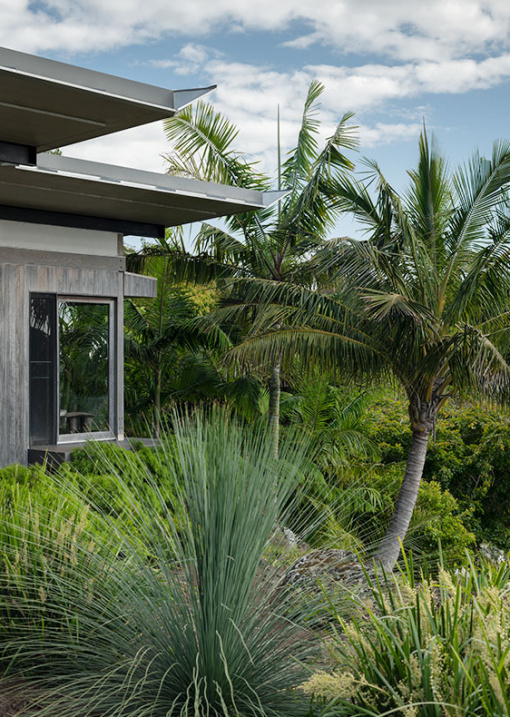The original vegetation covering this 120 acre property in Tyagarah NSW, would be termed in local Byron vernacular as ‘Big Scrub’. Characterised by tall sub-tropical rainforest and dense, mangrove-like swamps, the low-lands would have originally been home to thousands of plant and wildlife species, each inhabiting different microclimates in the rich environment.
It is landscape architect, jewellery designer and owner of the property, Lisa Hochhauser’s ambition to return the land under her stewardship to this primordial state. When she and her husband purchased the property in the late 2000s, it had been aggressively cleared for more than a hundred years: at first for agricultural purposes in the late 19th century, and then again in the 1950s and 60s, where the sandy coastal sections were mined for heavy metals. This left the area devastated, habitats ruined, and countless species lost.
‘The land was totally unkept and uncared for, and my initial inclination (and a compelling reason to take this project on) was my desire to reinstate the majesty and beauty that was once here,’ Lisa says. Of the 120 acres, Lisa marked 10 for her own garden and the rest for reforestation projects, both of which she works on with her team at LANDstudio.
‘When we first walked the property it was overrun with lantana and camphor laurel (a rampant weed species in the area),’ she describes. ‘The hillside was littered with basaltic rock boulders of every size, inhibiting normal paddock slashing and upkeep.’
Despite enthusiasm for her wilding project, the weather proved an almost insurmountable challenge. The expansive garden envelopes many microclimates, each susceptible in different ways to weather extremes. This meant that a lot of trial and error was involved in establishing feasible flora networks, some failing in certain areas yet surviving in others. Sometimes, additional interventions had to be made to aid the natural revegetation process – such as a vast lily pond that nourishes the plant-life encircling it, or blending plants traditionally native to different terrains.
‘The site regeneration was to include not only Big Scrub species but some of the wetland and swamp-loving species to address the low-lying areas as well as hill slopes and gully areas,’ Lisa points out.
For the residential garden, the palette was kept understated in order to fuse seamlessly with the regenerating heathland. Pre-existing freshwater springs were expanded to create swimming holes and a lagoon-like pool, as well as water storage for the vast replanting program Lisa and her team were undertaking on other parts of the property. These pools also brought back native birdlife and fed the the surrounding plants.
‘There was so much rock onsite, covered in the most beautiful lichen and moss that I could not help incorporating it,’ says Lisa. It has been woven into nearly every corner of the garden, supporting waterfall features, lining the outdoor shower and decorating the courtyards.
Though hard, robust materials define the jungle-like section of the property, the planting scheme softens as you get closer to the house. Draping verdure is peppered with rare and unusual flowerings such as orchids, which give a delicate flamboyance to the sub-tropical terrain.
Lisa describes the ongoing results of the regeneration project, which is now nearing a decade:
‘As the garden has become more and more established as time goes on, the land sings with joy. It is once again covered with foliage and thus protected, no longer exposed, weed-infested or bare, compacted paddock. The land no longer loses topsoil, it is creating topsoil. It is forever my teacher and my inspiration.’
See more projects by LANDstudio here.

Multiple verandas at Lisa and Robert’s house overlook the protected heathland under their stewardship, which stretches all the way out to the Byron Cape. Photo – Nicholas Watt.

Lisa set aside ten acres of the sprawling 120 for the residential garden, leaving the rest for reforestation projects. Photo – Nicholas Watt.

Existing natural springs on the site were repurposed as swimming holes and ponds, including this incredible lush pool. Photo – Nicholas Watt.

The springs are an important component of microclimate, which allows the surrounding vegetation to thrive. Photo – Nicholas Watt.

Every room in the house overlooks the garden. Photo – Nicholas Watt.

The garden is integrated into the home, creeping into the structure at every opportunity. Photo – Nicholas Watt.

The terrain would previously have been termed ‘Big Scrub’ in local vernacular. Combining low-lying wetland and tall sub-tropical rainforest, it’s a unique and extraordinarily diverse pocket of wilderness. Photo – Nicholas Watt.

A sweeping lily pond feeds the surrounding biota. Photo – Nicholas Watt.

The area was originally cleared for agricultural purposes in the 19th century, and then again for mining heavy metals in the mid-twentieth century. Photo – Nicholas Watt.

It’s simply jungle-like! Photo – Nicholas Watt.

As you get closer to the house, the palette softens. Rare and exotic orchids and other flowerings create pockets of delicate flamboyance and colour amongst the overwhelming, sturdy rainforest. Photo – Nicholas Watt.

The house, garden and reforestation areas live in total harmony on this immense property. Photo – Nicholas Watt.


